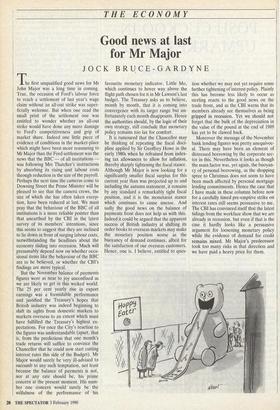THE ECONOMY
Good news at last for Mr Major
JOCK BRUCE-GARDYNE
he first unqualified good news for Mr John Major was a long time in coming. True, the occasion of Ford's labour force to reach a settlement of last year's wage claim without an all-out strike was super- ficially welcome. But when one read the small print of the settlement one was entitled to wonder whether an all-out strike would have done any more damage to Ford's competitiveness and grip of market share. Indeed one little piece of evidence of conditions in the market-place which might have been more reassuring to Mr Major than the Ford settlement was the news that the BBC — of all institutions — was following Mrs Thatcher's instructions by absorbing its rising unit labour costs through reduction in the size of the payroll. Perhaps the next time the cameras come to Downing Street the Prime Minister will be pleased to see that the camera crews, the size of which she has often taken excep- tion, have been reduced at last. We must pray that the behaviour of the BBC of all institutions is a more reliable pointer than that unearthed by the CBI in the latest survey of its members' intentions, since this seems to suggest that they are inclined to fie down in front of surging labour costs, notwithstanding the headlines about the economy sliding into recession. Much will presumably depend now on whether occa- sional items like the behaviour of the BBC are to be believed, or whether the CBI's findings are more typical.
But the November balance of payments figures were as near to joy unconfined as we are likely to get in this wicked world. The 25 per cent yearly rise in export earnings was a formidable performance and justified the Treasury's hopes that British industry was indeed beginning to shift its sights from domestic markets to markets overseas to an extent which must have fulfilled the Treasury's highest ex- pectations. For once the City's reaction to the figures was understandable (apart, that is, from the predictions that one month's trade returns will suffice to convince the Chancellor that he could now start cutting interest rates this side of the Budget). Mr Major would surely be very ill-advised to succumb to any such temptation, not least because the balance of payments is not, nor at any rate should be, his prime concern at the present moment. His num- ber one concern would surely be the wilfulness of the performance of his favourite monetary indicator, Little Mo, which continues to hover way above the flight path chosen for it in Mr Lawson's last budget. The Treasury asks us to believe, month by month, that it is coming into convergence with its target range but un- fortunately each month disappoints. Hence the authorities should, by the logic of their own strategy, still conclude that monetary policy remains too lax for comfort.
It is rumoured that the Chancellor may be thinking of repeating the fiscal disci- pline applied by Sir Geoffrey Howe in the early 1980s when he refrained from index- ing tax allowances to allow for inflation, thereby sharply tightening the fiscal stance. Although Mr Major is now looking for a significantly smaller fiscal surplus for this current year than was projected up to and including the autumn statement, it remains by any standard a remarkably tight fiscal position, and it is the monetarist stance which continues to cause unease. And sadly the good news on the balance of payments front does not help us with this. Indeed it could be argued that the apparent success of British industry at shifting its order books to overseas markets may make the monetary position worse as the buoyancy of demand continues, albeit for the satisfaction of our overseas customers. Hence, one is, I believe, entitled to ques-
tion whether we may not yet require some further tightening of interest policy. Plainly this has become less likely to occur as sterling reacts to the good news on the trade front, and as the CBI warns that its members already see themselves as being gripped in recession. Yet we should not forget that the bulk of the depreciation in the value of the pound at the end of 1989 has yet to be clawed back.
Moreover the message of the November bank lending figures was pretty unequivoc- al. There may have been an element of distressed borrowing by the corporate sec- tor in this. Nevertheless it looks as though the main factor was, yet again, the buoyan- cy of personal borrowing, as the shopping spree to Christmas does not seem to have been much affected by personal mortgage lending commitments. Hence the case that have made in these columns before now for a carefully timed pre-emptive strike on interest rates still seems persuasive to me. The CBI has convinced itself that the latest tidings from the workface show that we are already in recession, but even if that is the case it hardly looks like a persuasive argument for loosening monetary policy while the evidence of demand for credit remains mixed. Mr Major's predecessor took too many risks in that direction and we have paid a heavy price for them.


















































 Previous page
Previous page